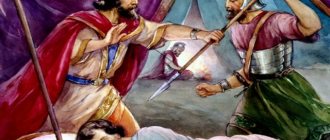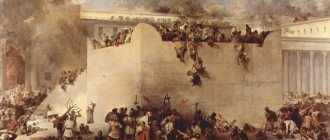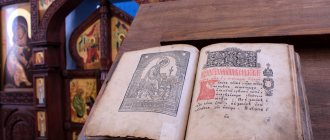"Save me, God!".
Thank you for visiting our website, before you start studying the information, please subscribe to our Orthodox community on Instagram, Lord, Save and Preserve † - https://www.instagram.com/spasi.gospodi/. The community has more than 60,000 subscribers. There are many of us like-minded people and we are growing quickly, we post prayers, sayings of saints, prayer requests, and timely post useful information about holidays and Orthodox events... Subscribe. Guardian Angel to you!
The exact period in which King David wrote the psalm “Bless my soul the Lord” is unknown, but it is assumed that he wrote the text in a quiet time for himself. Texts 102 and 103 are inseparable because they complement each other.
What are psalms
All psalms are written down in a book called the Psalter. Like the prayer book, it is highly revered among Christians. The main difference between psalms and prayers is that they are chanted. In addition, it is necessary to take into account the fact that they all came from the pens of ordinary people. In other words, there is no talk of any divine origin. If some texts of prayers were revealed to people solely by the will of heaven, then the psalms were written by righteous Christians living according to the commandments of God.
Find out what awaits you today - Horoscope for today for all zodiac signs
The most famous author of such texts is King David. It is noteworthy that some psalms were written by him in those years when he was just the anointed of the Lord, but had not yet ascended the throne. This is explained by the fact that David was always distinguished by his love for the Almighty and all His creations. Although, as you know, he himself was not always a righteous man. Some of his psalms were written at a time when he realized the severity of the sin he had committed and turned to heaven with a prayer for mercy and repentance.
Psalm 102, the text of which is very well known to many Christians, is also the creation of King David. It is included by the church in the process of worship, so it can also be heard during liturgies in the church. It is believed that every Christian must read it, since it contains special spiritual energy. According to the clergy, reading the psalm can help one find spiritual balance and draw closer to the Lord.
The history of writing the psalm
Every prayer and absolutely every psalm has a specific story. Some of them are very exciting and therefore immediately attract a person's attention. However, not all stories are like this. The same can be said about Psalm 103. It should immediately be noted that scientists do not know as much about it as we would like.
This psalm is in pairs. That is, he has a couple. Therefore, it is not permissible to read it separately. It is for this reason that it is always read along with Psalm 103. Please note that this is not the only paired text. Psalms 18 and 19, 69 and 70 are also paired. Their peculiarity is the overlapping meaning. In other words, grasping the meaning of a paired psalm that was read alone will be very problematic. It is for this reason that the clergy categorically prohibit reading only one of the psalms. Indeed, in this case, the believer will not even be able to really understand what the text says.
Due to numerous requests from readers, we have prepared an “Orthodox Calendar” application for smartphones. Every morning you will receive information about the current day: holidays, fasts, days of remembrance, prayers, parables. Download for free: Orthodox Calendar 2022 (available on Android)
All of them were written by King David. And there is not the slightest doubt about this. Of course, this statement is based on certain facts. Indeed, the signature that can be found before each psalm clearly states that King David is its author. In ancient times he ruled Israel and became famous as a righteous man.
But he became a true righteous man after he committed a sin that he decided to keep silent about. But he failed to hide the truth from the Lord, so the ruler was subsequently severely punished by heaven. The punishment sent down from above helped him realize how great his sin was and sincerely repent of it.
We read the Psalter. Psalm 102
Audio |
Conversation with Archpriest Alexy Ladygin about the Psalter.
Dear brothers and sisters, we continue to study the Psalter and today we will talk about the 102nd Psalm. It has a prescriptive text: “psalm to David, 102.” This beautiful psalm glorifies the Lord and sends thanks to Him for the great mercies that the Lord bestows on those who fear Him. We hear this psalm very often during divine services; it is sublime, very beautiful, and spiritual. “Bless the Lord, my soul, and all that is within me, His holy name.” The psalmist David calls on everyone to glorify the name of the Lord. You and I have said more than once that the name of the Lord is of great importance in our spiritual life, because it is filled with enormous power. “In My name the demons will be destroyed,” says Christ Himself. The psalmist calls for all our inner strength to glorify the Lord and for glorification to come from the depths of our soul.
“Bless the Lord, my soul, and do not forget all His rewards.” Here the Psalmist urges that while we glorify the Lord, we do not forget about all the good deeds that He directs to the individual and to the entire human race. The Lord is long-suffering and abundantly merciful, generous in His goodness for each of us. We must not forget that the Lord does not look at our faces - He gives blessings to the evil and the good alike, because He loves man. He commands His sun to rise on the evil and the good and sends rain on the righteous and the unrighteous, so that everyone feels His mercy and goodness and gives thanks to their Creator.
“Who cleanses all your iniquities, who heals all your diseases.” The Lord not only has mercy on us, not only gives us His bounties, but also cleanses all our untruths, all our iniquities: He gave us the great sacrament of Repentance, when everyone who brings repentance receives deliverance - “whose sins you forgive, their sins will be forgiven; on whomever you leave it, it will remain on him.” The Lord, through repentance, cleanses all our untruths, all our iniquities. “He who heals all your ailments” - With His Blood the Lord heals every person. It is no coincidence that the Holy Scripture tells us: “We were wounded for our sins and tormented for our iniquities, the punishment of our peace was upon Him, by His wound we were healed” - we receive healing through the Blood of the Divine Savior, how can we not thank Him for this? The Lord has done everything for us, we only must gratefully accept His gift - the atoning Sacrifice that the Lord directed towards each of us. Very little is required of us, the Lord does not require many things from us, but the most important thing is to accept what He gives and be grateful for His benefits. This gratitude spreads as we glorify His name and bless Him.
“He who delivers your belly from corruption, who crowns you with mercy and bounties.” The Lord gives us eternal life and sends His mercy and bounty. Of course, we too must be like the Lord, because the Lord gives His mercy only to the merciful. “Blessed are the merciful, for they will receive mercy.”
“He who fulfills your good desires: your youth will be renewed like an eagle.” The Lord fulfills our good desires, gives us the opportunity and grace so that everything good and good will be fulfilled in our lives. At the same time, He renews man: just as the Lord renews the eagle in life, gives it the opportunity to soar higher than other birds, to look openly with its eyes at the light, so the Lord lifts us up from earth to Heaven and says that each of us should have desire for Heaven, and He will give renewal and the opportunity to remain in eternity.
“The Lord show mercy and destiny to all those who are offended” - He shows mercy and righteous judgment to those who are offended. We must accept with patience everything that happens in our lives - the Lord never abandons His own.
“Moses told His ways to the sons of Israel His desires.” How does the Lord show His mercy? He shows us the right path. When a person does not know which way to go, he begins to rush around: he thinks about what is the right thing to do, how to do the right thing so that his business will run, so as not to quarrel with his friends, not to make a mistake when choosing a university, and so on. A person is constantly in confusion, so he often comes to his spiritual fathers and mentors and asks: “Father, what is the right thing to do?” – a person does not know what will follow the action, he does not see the final result.
In spiritual life, the Lord does not leave us in the dark, He gives us instructions in life, and if we follow these instructions - we call them the commandments of God, then we join eternity, the Lord gives us eternal life. We must clearly understand that this gives us the opportunity not only to join eternity, but also to be rewarded with a calm, even life on earth. Therefore, the Psalmist says: “Moses told His way, He told the children of Israel His desires” - through Moses, the Lord gave the children of Israel the right path through fulfilling the commandments of God - and each of us is introduced through these commandments and through the Gospel commandments to the right path.
“The Lord is generous and gracious, slow to anger and abounding in mercy.” The Lord gives everything to man by His mercy, He is patient and shows His rich mercies and bounties. This gives us the opportunity to gain eternal life and avoid the desperate state we might have fallen into in our lives. The Lord is in no hurry to punish us, does not send us difficulties for our untruths, but sometimes is very patient with us, for he wants each of us to come to the mind of truth - to feel God’s love for ourselves and through this to join eternity. And the Lord delays judgment until the last moment, until His terrible Second Coming.
“He is not completely angry, he is at enmity forever”... The psalmist says that the Lord is in no hurry to punish: although he sees the severity of our sin, he endures to the last, expects from us repentance, the desire to fulfill God’s commandments and correct the state in which we often we fall into self-will.
“He did not make us eat because of our iniquities, but repaid us because of our sins. As the height of heaven from the earth, the Lord established His mercy on those who fear Him: the east is far from the west, He has removed our iniquities from us.” Here the Psalmist shows the height and breadth: “For as the height of heaven is from the earth, the Lord established His mercy on those who fear Him” - so enormous is the mercy, there is probably no more measurement in height and distance. “The east is far removed from the west; our iniquities have been removed from us” - such distance is shown by the Psalmist David: the measure of God’s mercy over us is high, it is impossible to compare it with anything and cannot be measured by anything.
“As a father gives generously to his sons, the Lord will provide for those who fear Him.” Here the Psalmist talks about how an earthly father raises his child: sometimes he doesn’t notice something, he explains, somewhere he admonishes, he guides him - if an earthly father cares so much about his son, how much more so does the Heavenly Father. Will a woman forget her suckling child, so as not to have compassion on the son of her womb? but if she also forgot, then I will not forget you, says the Holy Scripture: The Lord will never forget a person, He will always be generous, merciful, will guide us and worry about our wrong life, show us the path we should follow, somewhere to admonish us a little so that we come to the mind of truth and, of course, to salvation.
“As He knew our creation, I will remember Him as the dust of Esma” - the Lord understands where our weakness comes from: we are earthly, we are created from the earth, and therefore very weak, and in our weakness we commit sin: not out of malice (although our will after the Fall is more directed towards evil than towards good, and this is where our weakness is manifested), but due to our weakness we very often sin - we take the wrong steps. The Lord understands how weak we are, therefore He shows His generosity and mercy. By earthly standards, we understand that for parents a weak child is closer than a healthy and strong one, because a healthy and strong one can survive without support, but for a weak, sick child, parents worry more in their hearts, try to help more, devote themselves more to him. So the Lord sees our weakness, and therefore shows such enormous generosity that cannot be measured by any earthly measurements.
“Man, like the grass of his days, like the flower of the field, so will he bloom.” What is our life? Like grass, our days pass very quickly: no matter how famous we are, no matter what we strive for, life will pass very quickly, and the words of Holy Scripture always call us to ensure that we do not strive to acquire the riches of earthly life, do not enjoy our power: What will you carry into eternal life? That untruth, or that pride that filled you? Or material goods? But they are worthless in eternity... What were you striving for? What have you received in this life? Here it is appropriate to recall Ecclesiastes, who, looking at all the aspirations of the kings and great luminaries of this life, said: “Everything is vanity of vanities and vexation of spirit.” Your life is over - what's next? Further you can only carry away the longing of this life and the understanding that you have become attached to it, but everything that you have become attached to remains here, and you remain there. Here is your heart - that means here is your wealth, but there you have nothing: neither wealth, nor anything with which you can justify yourself in eternity - this is the most terrible thing.
Unfortunately, we don't understand this. Unfortunately, the ideology of this life ties us to earthly life, but does not open Heaven. And only the one who finds God gains eternal wealth and begins to despise earthly wealth, realizing that it pulls away from real life, from communication with God. This is what is valuable to your heart, this is what we should strive for. An amazing psalm that reveals a lot to us! It contains, perhaps, the entire theology of our Christian Church.
“For a spirit has passed through it, and is not, and no one knows its place”—the soul is called spirit here; while it is in the human body, the person is alive, but the time comes, the Lord takes the soul, and then the body becomes faceless - now we are distinguished by our face, our article, our body, but when life leaves us, the soul goes to God, then the body decomposes - and one skeleton cannot be distinguished from another. The true face no longer exists, it will be restored only by the Lord during the Last Judgment... And so we become faceless, and the body does not find its place on earth. Who will find this place where: who will be in the air, who will be in the sea, who will be burned by fire, who will find their grave - no one knows anything. Indeed, “no one knows his place.”
“The mercy of the Lord is from everlasting to everlasting on those who fear Him, and His righteousness is on the sons of sons, who keep His covenant and remember His commandments to do.” This is what a person should strive for - to fulfill the commandments of God: each of us must fill ourselves with the fear of God and remember that by not fulfilling the commandments of God we can lose the love of God - and this is the worst thing in life.
One should not be afraid of what the Lord will punish; the Lord is merciful and long-suffering. The worst thing in this life is to lose the Lord. If we lose Him in this life, then in eternity we ourselves will not accept Him, we will run from Him as a stranger. And when a person loves God, he is afraid of losing God’s love, for him God is a great value, a great joy. He strives for this joy in life, and in eternity he acquires something valuable that he could not fully acquire - he begins to fully communicate with God, and this communication brings him great joy. Without God's commandments we are not God's people. “Whoever keeps My commandments loves Me,” says the Lord.
“The Lord has prepared His Throne in heaven, and His Kingdom possesses all.” The Lord possesses everyone and reigns only over those who strive for eternal life, for the fulfillment of His commandments - He created His Kingdom and calls everyone to enter this Kingdom: “Come to Me, all you who labor and are heavy laden, and I will give you rest.” He does not forcibly reign over everyone, but possesses everyone: everyone, whether he wants it or not, accepts it or does not accept it, will still live according to the will of God, according to the Providence of God - the way the Lord rules in your life. Sometimes the Lord, through some of His actions, reveals Himself to you, reveals your desire and understanding of life - you want one thing, but in life it happens not as you want, but as the Lord gives. When your will unites with the will of God, everything works out for you, and when you think: “I will do this, like this, like this,” then your plans begin to crumble, and you understand that you cannot do anything without God. can. And if you do without God, you will again find yourself with nothing.
“Bless the Lord, all His angels, mighty in strength, who do His word, to hear the voice of His words” - the Psalmist says who should glorify the Lord, who constantly glorifies Him. Of course, all the angels glorify Him, they are called mighty with strength, those who create His word - those who always create the word of God and hear the voice of His words (here the desire is very strongly shown that we should strive to become like the angels glorifying the Lord).
“Bless the Lord, all His might, His servants who do His will” - all His might: we know that incorporeal forces are also different - some are good, some are evil. But only those His servants who do His will will glorify the Lord.
“Bless the Lord, all His works in every place of His dominion: bless the Lord, O my soul,” - with these words the Psalmist ends Psalm 103, but most importantly: “Bless the Lord, all His might, His servants who do His will.” Who is like the angels? Monastics who carry out the venerable feat are likened to angels (we say: the angelic order), for they renounce their own will, but in everything they do the will of God and are servants of God not according to their destiny, but according to their service. If there is service, then the same is destiny, say the holy fathers, therefore whoever is like the angels in his service to God is identical with this Heavenly rank. We are talking about monastics, about all the saints and righteous people who served the Lord in faith and truth, they become like God and become angels here on earth, because they completely cut off their will and strive to direct all their service to the Lord. And today the Psalmist calls each of us to serve God through the creation of His will, that is, through the fulfillment of His commandments.
“Bless the Lord, all His works, in every place of His dominion: bless the Lord, O my soul.” Very strong words! All His works - that is, look at the works of God: if you see this world with rational eyes, then you cannot help but glorify God: how much He does for this world, for a specific person! If we cannot see this through the whole world, then look at your life - and you will see how much the Lord saved you, how much He did for you in this life, how much He does for your children, your works, so that they are established in this life... A wise person, looking at this, will always say: “Lord, You are always with me, You always help me! No matter what state I am in, no matter what troubles and temptations visit me, You always give me the opportunity for joy, You make me feel Your mercy and closeness to me” - bless, my soul, the Lord in every place of His dominion! If we are talking about the Israeli people, about the Jews, then we can tell them to read this psalm carefully - you can glorify the Lord not in one place, in Jerusalem, but in every place of His dominion - throughout the entire Universe you can glorify the Lord; in this regard, we are not abandoned anywhere, we cannot say that God sees us here, but not there, here we can relax something for ourselves, and there we can fulfill His commandments - God is present everywhere, in every place, and in every place we must glorify His holy name.
In this regard, our compatriots showed enormous strength, who, after the revolution and after the Soviet era, were thrown by fate to different corners of the world - and everywhere, in every country, there are holy Orthodox churches with golden domes, with golden crosses, and there the name of the Lord is glorified, be this is a Muslim country, or a country professing other religions of the world, but where the Russian community appears, a temple appears there, and in this place the name of God is glorified, because this is also the place of the sovereignty of the Lord Himself. This is such an amazing psalm, dear brothers and sisters, that we studied today, albeit briefly, and probably discovered the rich world of our Christian relationships.
Recorded by Nina Kirsanova
Time of writing
But if specialists had absolutely no problems determining authorship, then with the time of writing it is not so simple. There is absolutely no hint in the text itself as to exactly what time the psalm might have been written. For this reason, researchers of religion had to focus exclusively on the text itself, or more precisely, on the manner of writing the psalm.
For example, the psalm written by David after realizing the gravity of the sin of adultery he had committed is filled with sadness and a desire to repent. Such expressions clearly indicate that David was in an emotionally depressed state.
Contents of the Psalm
Judging by the test of Psalm 103, it is somewhat different from the others. Because in it David exclusively praises the Most High, His greatness. Comparing this text with others, one important detail becomes obvious: when writing it, the author was completely calm. This suggests that the author wrote the text during his peaceful reign.
As you know, the ruler lived for many years with several wives. Simply put, he had a whole harem. In those years, this was not considered something strange for rulers. But still, many priests reproached the king for categorically refusing to dissolve the harem. And there was a good reason for this. David's children were at enmity with each other. Each of them dreamed of taking the throne of their father.
This circumstance greatly darkened David’s life. After all, he was actually very attached to his children. Proof of this is his reverent attitude towards his son named Absalom. It was this youth who betrayed him first.
The young man, who enjoyed authority among the courtiers and was also a favorite of the common people, rebelled against his father. Because of this, David was forced to leave Israel and wander with his loyal soldiers. Returning to his country, David managed to suppress the uprising and regain power. He forgave his son and gave the order to the soldiers to return him to the castle. However, Absalom, fearing his father's wrath, fled. He died during the escape. The news of the death of his son came as a strong blow to the ruler.
Returning to the discussion of the text of Psalm 102, it should be noted that there is absolutely no hint of the author’s mental suffering. That is why church ministers are also inclined to believe that it was written in times of peace, when the ruler had a rare opportunity to talk about the meaning of life and the greatness of the Lord. That is, if we answer the question why this psalm is read, then we can say that it is to calm the soul and glorify the power of the Almighty.
If we rely on historical facts, then a time of peace came to Israel already at the dawn of David’s reign. From this it follows that Psalm 102 could have been written by the king in his old age. That is, answering the question why this psalm is read, we can say that to calm the soul and glorify the power of the Almighty.
102:1-5 Psalm of David. Bless the Lord, my soul, and my whole being is His holy name. 2 Bless the Lord, my soul, and do not forget all His benefits. 3 He forgives all your iniquities, He heals all your diseases; 4 He delivers your life from the grave, crowns you with mercy and bounty; 5 satisfies your desire with good things: your youth is renewed like the eagle.And again David sings to the Lord, asks his soul and his insides (himself, that is) not to be forgetful and ungrateful towards the Lord, for God forgave David many times and healed all his spiritual illnesses, torments and doubts, blessed David with His bounties and mercy towards him, helps him find satisfaction in life and creates an optimistic spirit in David.
Saying “bless the Lord, my soul... for He forgives all your iniquities...” - he seems to be talking to himself, giving himself the right instructions about his relationship with God, telling himself in the second person so that the reasons sound more convincing to him , according to which David would be obliged to thank his God all the days of his life.
102:6,7 The Lord brings righteousness and judgment to all who are offended. 7 He showed His ways to Moses, and to the children of Israel His works.
God creates righteousness and judgment for all those who are offended: it must be said that in this age judgment on evil deeds is not quickly carried out, but Moses and the sons of Israel also happened to see in this age the judgments of God on those who caused evil to the people of God. And not only to see the courts, but also to receive explanations from God on how to live correctly in this century.
102:8,9 The Lord is generous and gracious, slow to anger and abounding in mercy: 9 He is not angry to the end, neither is he indignant forever.
David admires the qualities of the God of Israel: He is generous and abundantly merciful, He is not completely angry - that is, he mitigates punishments for misdeeds, and He is not forever indignant - He does not forever turn away from those who have stumbled and sinned, but forgives them many times when they repent. And if he had been angry to the end, not a single person would have been left alive on earth since the moment of sin in Eden.
102:10 He did not deal with us according to our iniquities, nor did He reward us according to our sins:
He did not do it to us because of our iniquities - if God had rewarded us with what we all truly deserve in justice - then not a single person would have survived. But He is abundantly merciful and long-suffering, which is why the human race on earth has not yet died out, which is why people in this century still have the opportunity to rejoice in the fact that they live on God’s planet and accept His path for themselves.
102:11 for as the heavens are high above the earth, so great is the mercy [of the Lord] toward those who fear Him;
The magnitude of God's mercy towards man is even impossible to measure: just as it is impossible to measure the height of the heavens, it is also impossible to imagine how merciful God is to humanity
102: 12
As far as the east is from the west, so has He removed our iniquities from us;
And the fact that God does not notice our iniquities is a great marvel: just as the east is far from the west, so our iniquities are far from us in His eyes, although in reality this is not the case.
102:13,14 As a father has mercy on his sons, so the Lord has mercy on those who fear Him. 14 For He knows our composition; He remembers that we are dust.
He is a Father who loves His children, and therefore He is merciful and long-suffering towards His unlucky children, and therefore He forgives us a lot, for He knows that we are weak and cannot help but sin in this age, full of temptations and stumblings.
102:15,16 Man's days are like grass; like the flower of the field, so it blooms. 16 The wind passes over him, and he is no more, and his place knows him no more.
A person is like dust under his feet, and his days are like the days of a field flower, short-lived and full of dangers: just the “wind” of obstacles blows, and a person can easily break down and disappear.
102:17 But the mercy of the Lord is from everlasting to everlasting to those who fear Him,
The mercy of the Lord is manifested to people in all ages, but not to everyone, but to those who fear Him: to those who realize the greatness and power of their Creator.
102:18 and His righteousness is upon the sons of sons, who keep His covenant and remember His commandments to do them.
And the truth of God will be fulfilled only on His sons - on those who recognize, keep and fulfill the commandments of their heavenly Father.
102:19 The Lord has set His throne in heaven, and His kingdom rules over all.
The Throne of God is in heaven and His kingdom extends over everything, God reigns over His entire universe, including the earth.
102:20-22 Bless the Lord, [all] His angels, mighty in power, who do His word, obeying the voice of His word; 21 Bless the Lord, all his armies, all his servants, who do his will; 22 Bless the Lord, all His works, in all the places of His dominion. Bless the Lord, my soul!
David turns to the angels, mighty in strength, obeying the voice of God and fulfilling all His commands unconditionally, so that all the heavenly armies of the God of Israel may be blessed. All earthly servants of God who defend the interests of the Almighty on earth also belong to the army of God. And David asks himself to bless the Lord along with the angels and the entire army of God’s servants, not only heavenly, but also earthly.
Interpretation of the Psalm
Each psalm contains a specific meaning. Before you start reading the text of the psalm, you need to try to understand what exactly its author wanted to say. In the case of the psalm in question, everything is quite simple. After all, its main meaning is to praise the Almighty:
- David argues that the wrath of the Lord is always just, but it never lasts long. Once a person realizes that he has made a mistake and begins to repent, heaven will grant him forgiveness;
- The power of God is absolute - man cannot even imagine the power of the Creator. After all, it is he who controls the life of every creature living on earth, and also writes the fate of all people;
- the commandments given by the Almighty are a manifestation of care and mercy - one should not perceive the need to live according to the commandments as something unfair. After all, such a righteous life opens the gates of heaven for a Christian.
In addition, the text contains various comparisons. With their help, the author tried to show how great the Lord is. At the same time, he compares a person to flowers that quickly disappear. Thus, David hints that man in himself cannot even compare with the Lord. Because he is just his creation. This comparison is very relevant. After all, the worst sin of a person is pride. David devoted his entire life to learning not to put himself above the Creator. And this is what he tried to teach other people.
Interpretation of the Psalm
Every psalm contains a certain meaning. Before you start reading the text of the psalm, you need to try to understand what exactly its creator wanted to say. In the case of the psalm in question, everything is quite simple. After all, its main meaning is to praise the Almighty:
- David argues that the wrath of the Lord is constantly just, but despite all this, it never lasts long. As a person realizes that he has made a mistake and begins to repent, heaven grants him forgiveness;
- The power of God is absolute - man cannot even imagine the power of the Creator. After all, he specifically controls the life of every creature living on earth, and also writes the fate of all people;
- the commandments given by the Almighty are a manifestation of care and mercy - one should not accept the need to live according to the commandments as something unfair. After all, such a righteous life opens the gates of heaven for a Christian.
In addition, there are various comparisons in the text. With their help, the creator tried to show how great the Lord is. At the same time, he associates a person with flowers that are rapidly disappearing. Thus, David hints at the fact that man himself cannot even compare with the Lord. Since he is just his creation. This comparison is very poignant. After all, the worst sin of a person is pride. David dedicated his entire life to learning not to put himself above the Creator. And he tried to teach this to other people.
Rules for reading the psalm
The church version of the psalm, translated into Old Church Slavonic, is required to be read during the evening service, which is traditionally held on Saturday. Therefore, before reading the psalm yourself at home, it is recommended to visit the temple and listen to exactly how it should be sung.
Then you can simply follow a few recommendations given by spiritual mentors:
- the psalm must be recited - this requirement is relevant for absolutely all psalms, since they, in essence, are precisely a song that was written to express certain feelings to the Lord or to repent;
- the song should be joyful - the text should be read as solemnly as possible. Indeed, in this case we are talking specifically about a song of praise. This means that it should sound as solemn and festive as possible. This will help a person feel the mood of prayer;
- it is better to give preference to the Old Church Slavonic text - but in this case you must be guided by your own feelings. If a person has difficulty pronouncing words and understanding their meaning, you can use the version of the text translated into Russian.
Please note that reading the psalm is only allowed in a good mood.
Text of Psalm 102 in Russian
Bless, my soul, the Lord, and all that is within me, His holy name. Bless the Lord, my soul, and do not forget all His rewards, who cleanses all your iniquities, heals all your ailments, delivers your belly from corruption, crowns you with mercy and bounty, fulfills your desire for good: your youth will be renewed like an eagle. The Lord grant alms and destiny to all those who are offended. Moses told His way to the sons of Israel His desires: The Lord is generous and merciful, long-suffering and abundantly merciful. He is not completely angry, he is at enmity forever, he did not create food for us because of our iniquities, but he rewarded us with food because of our sins. As the height of heaven from the earth, the Lord established His mercy on those who feared Him. The east is far removed from the west, and our iniquities have been removed from us. As a father gives generously to his sons, the Lord will provide for those who fear Him. As we know our creation, I will remember, as the dust of Esma. Man, like the grass of his days, like the flower of the field, will bloom like the spirit that has passed through him, and he will not be, and no one will know his place. The mercy of the Lord is from everlasting to everlasting on those who fear Him, and His righteousness is on the sons of sons, who keep His covenant and remember His commandments to do. The Lord has prepared His Throne in Heaven, and His Kingdom possesses everyone. Bless the Lord, all His angels, mighty in strength, who do His word, to hear the voice of His words. Bless the Lord, all His might, His servants who do His will. Bless the Lord, all His works, in every place of His dominion, bless them, my soul. Gentlemen.
- Text of Psalm 22 in Russian;
- Interpretation of Psalm 37.
- Why do they read Psalm 34?









